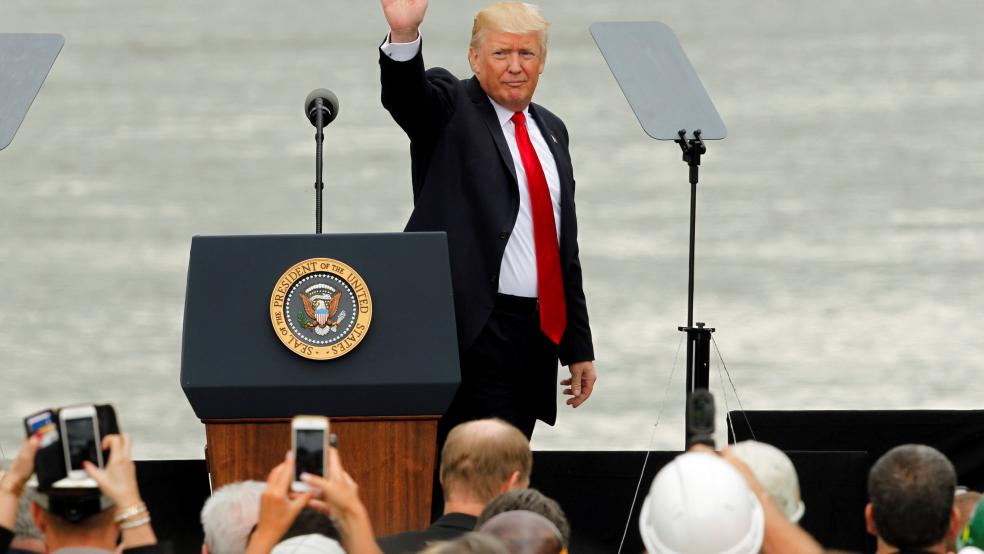A watchdog group that had criticized Donald Trump during his time as president-elect over his failure to divest his business holdings has now greeted President Donald Trump with a federal lawsuit claiming that he is violating the Constitution by allowing his company to accept payments from foreign governments. But legal experts are dubious about the suit’s potential for success.
Filed by Citizens for Responsibility and Ethics in Washington, the suit claims that by accepting payments from foreign governments, Trump is violation of the Foreign Emoluments Clause of the Constitution, which holds that “no Person holding any Office of Profit or Trust under [the United States], shall, without the Consent of the Congress, accept any present, Emolument, Office, or Title, of any kind whatever, from any King, Prince, or foreign State.”
Related: Why Trump's Family and Friends Are in for Heavy Financial Scrutiny
The suit claims that Trump “has violated the Constitution during the opening moments of his presidency and is poised to do so continually thereafter for the duration of his administration.” Violations occur every time the Trump Organization accepts payment from foreign government sources for the use of his hotels, golf courses, resorts, and other businesses.
In an interview on MSNBC Monday morning, CREW board chairman Norman Eisen, who served as the White House ethics attorney under Barack Obama, was explicit about what the ultimate goal of the suit is: getting access to the tax returns that Trump has consistently refused to make public, even though presidents have routinely done so for 40 years.
“In order to establish the emoluments violations, we are going to need to see the president’s tax returns,” Eisen said. “We’re going to seek them in discovery, so this is a vehicle in order to enforce the Constitution to get those taxes. Seventy-five percent of Americans, many Trump voters agree, we must have them. It’s unprecedented not to. We’re going to get them.”
However, successfully bringing a lawsuit requires that the plaintiff has the legal standing to do so, which in this case requires making a credible claim that CREW has suffered an injury from Trump’s alleged violation. Attorneys who have read the group’s complaint, though, were not convinced that it had done so.
Related: Trump Era Begins with Moves Against Regulations, Obamacare
CREW’s claim alleges, “CREW has been forced to divert essential and limited resources—including time and money—from other important matters that it ordinarily would have been handling to the Foreign Emoluments Clause issues involving Defendant, which have consumed the attention of the public and the media.”
Going forward, it claims, “CREW will essentially be forced into the role of litigating and educating the public regarding Defendant’s Foreign Emoluments Clause violations, rather than continuing its mission of serving as a watchdog on all ethical issues involving all parts of our government.”
Jonathan H. Adler, who directs the Center for Business Law and Regulation at Case Western Reserve University School of Law, called it “quite a stretch.”
“The mere fact that they are devoted to the issue and are going to have to spend some time on the issue is not enough,” he said in an interview. “If it worked, then any time any interest group sued over an issue they were focused on,” it would be granted standing, he added.
Related: Why Stocks Could Have a Rocky First Month Under Trump
In an analysis of the complaint, Josh Blackman, an Associate Professor of Law at the South Texas College of Law in Houston, agreed, calling the claim “incredibly weak.” Blackman points out that the precedent CREW relies on for its standing claim, Havens Realty Corp. v. Coleman, addresses a very different set of circumstances than those claimed by CREW, in which a court ruled that the defendant had violated a specific duty to the plaintiff.
While Adler and others said that the core of the complaint -- that Trump is in violation of the emoluments clause -- might have merit, others contested even that.
“Standing aside, the merits are what are lacking here. They make over-the-top allegations that are absurd against Mr. Trump, and if there’s a violation of the emoluments clause they haven’t made the case,” said Tom Fitton, President of Judicial Watch.
Fitton’s organization, a conservative-leaning, anti-corruption watchdog group that has spent years on lawsuits related to former President Bill Clinton and former secretary of state and recent Democratic presidential candidate Hillary Clinton, has been cautiously supportive of Trump’s decision not to divest his business.
Related: Trump’s Brand of Nationalism Reinforces a Divisive ‘Us v. Them’ Playbook
He said that CREW’s complaint doesn’t show any concrete proof of an emoluments clause violation because it misunderstands the definition of the term.
“It’s a legal word that has meaning, and that’s not what this is,” he said. “It is absurd to suggest that foreign dignitaries going to Trump hotels are an emolument. This is the silly season for the anti-Trump movement.”
Despite the apparent weakness of the standing argument, a number of prominent attorneys attached their names to the complaint, including Harvard University Professor Laurence H. Tribe, University of California-Irvine Law School Dean Erwin Chemerinsky, and two former White House ethics lawyers, Norman Eisen and Richard Painter, who both serve on CREW’s board of directors. This led many to suggest that actual success in court might be a secondary concern to the plaintiffs.
“This is a way of keeping attention to the emoluments clause issue,” said Prof. Adler of Case Western Reserve. “Sometimes when you file a lawsuit you are as interested in the court of public opinion as you are in a court of law.”
Additionally, he pointed out, “They may be thinking that filing the suit ... will induce people who might have a stronger standing claim to perhaps join the litigation or file a lawsuit of their own.”





